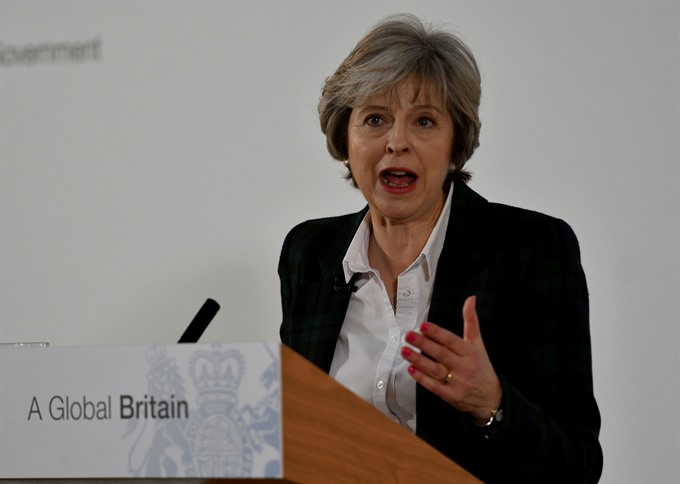 World
World

Prime Minister Theresa May unveiled her Brexit blueprint on Tuesday, announcing for the first time that Britain will leave Europe's single market in order to control EU immigration.
 |
| Britain’s Prime Minister Theresa May delivers her keynote "Brexit speech" in Lancaster House in London, Britain on Tuesday. British Prime Minister Theresa May on Tuesday confirmed that Britain will be leaving the single market while insisting that it wants to remain "the best friend and neighbour" to European partner. — XINHUA/VNA Photo |
LONDON — Prime Minister Theresa May unveiled her Brexit blueprint on Tuesday, announcing for the first time that Britain will leave Europe’s single market in order to control EU immigration.
In a highly-anticipated speech, May warned the EU against imposing harsh terms on Britain’s divorce from the bloc after more than four decades of membership.
She revealed Britain would look to strike a new customs agreement with the EU, enabling it to forge its own trade deals with the rest of the world.
And in a concession to parliamentary critics, the Conservative leader also said lawmakers would get a vote on any final Brexit agreement negotiated with Brussels.
EU leaders have insisted single market membership means accepting free movement -- a key issue in Britain’s shock June referendum vote to become the first country to leave the 28-member group.
"Brexit must mean control of the number of people who come to Britain from Europe. And that is what we will deliver," May told foreign ambassadors in London.
"What I am proposing cannot mean membership of the single market."
EU immigration to Britain ran at 284,000 in the year to June 2016.
The European Commission’s chief Brexit negotiator Michel Barnier warned that an orderly divorce from the bloc within the specified two years was a "prerequisite" for any future free trade deal.
EU president Donald Tusk said May’s plans were "at least more realistic" about what London wanted.
May phoned Tusk and European Commission president Jean-Claude Juncker following her speech, telling them the UK would seek the "greatest possible access to it (the single market) through a new, comprehensive, bold and ambitious free trade agreement", a Downing Street spokeswoman said.
The prime minister also called German Chancellor Angela Merkel and French President Francois Hollande.
"She told both that the UK wanted the EU to thrive, understood the importance of the ’four freedoms’ of the single market and that the UK would not be seeking membership of the single market," May’s spokeswoman said.
In Paris, Hollande "noted" May’s "clarification" and hoped negotiations would start swiftly after Britain formally notifies the EU of its exit, a presidential aide said. May also stressed that British-French ties in security and defence would remain, the source said.
Good deal or no deal
Britain has two years to negotiate a break-up deal once May triggers Article 50 of the Lisbon Treaty, officially declaring the country’s intention to quit, or face leaving with no agreement.
May said London could accept departing on such terms if Brussels played hardball, but it would hurt the EU hardest.
"No deal for Britain is better than a bad deal for Britain," she said.
May has promised to trigger Article 50 by the end of March, and said she was confident final settlements could be negotiated within the two-year timeframe.
Seeking to calm fears of a sudden jolt to the economy on abruptly leaving the EU in 2019, May said she would seek a "phased process of implementation".
EU countries accounted for 44 per cent of Britain’s total exports in goods and services in 2015, with the country recording a £68.6 billion (US$82.7 billion) trade deficit with the bloc.
The single market without Britain covers 460 million people.
Brussels has estimated the bill Britain will have to pay at 55 to 60 billion euros, EU sources said.
The British currency has endured a rocky ride since the June referendum, but sterling responded strongly to May’s speech, wiping out losses earlier in the week to stand at $1.2379 at 1730 GMT.
"The prime minister has adopted a more pragmatic approach to Brexit than expected, providing some much needed relief for the pound," said NFS Macro analyst Nick Stamenkovic. London stocks closed down 1.5 per cent at 7,220.38 points. — AFP




